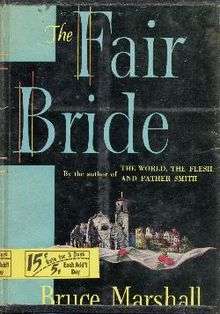The Fair Bride
 First US edition | |
| Author | Bruce Marshall |
|---|---|
| Country | United Kingdom (Scotland) |
| Language | English |
| Publisher |
Constable (UK) Houghton Mifflin (US) |
Publication date | 1953 |
| Media type | Print (Hardback) |
| Pages | 274 |
| Preceded by | To Every Man a Penny (1949) |
| Followed by | Only Fade Away (1954) |
The Fair Bride is a 1953 novel by Scottish writer Bruce Marshall.
Plot summary
A priest finds himself on the run from the Spanish Republicans, who accuse priests of indoctrinating their followers against them. The priest slips into a cabaret to hide and meets a young girl, an entertainer in the club. His commitment to the priesthood is wavering due to the persecution he suffers and he begins to fall for her. Both of them wind up being arrested.
Meanwhile, both sides are searching for a sacred relic that is believed to have miraculous powers - it is said to have helped defeat Napoleon. Each side wants it for its own reasons. The relic ends up in the priest’s possession.
Analysis
The Spanish Republicans have been lionized for decades for their struggle against Francisco Franco’s pre-war alliance with fascism. The novel reveals an under-publicized truth - that the Spanish Republicans singled out religious targets and many harmless middle class targets and killed or persecuted them. It depicts the Republicans running areas under their control along Stalinist lines.[1]
Adaptation
The novel was the basis of the 1960 film The Angel Wore Red starring Ava Gardner, Dirk Bogarde, Joseph Cotten and Vittorio De Sica, which was the last film directed by Nunnally Johnson.
References
- ↑ Marshall, Bruce. The Fair Bride, Houghton Mifflin Company, Boston, 1953.